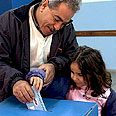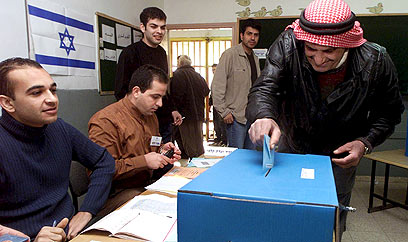
Arab organization calls for election boycott
New movement calls on Israeli-Arab public not to take part in Knesset elections; in Ynet interview, one of movement's leaders explains why Israeli-Arabs need their own parliament, why he does not feel part of State
"The Popular Committee for Boycotting the Elections" is attempting to explain to the Arab public that voting for the Israeli parliament is a waste of resources, and that efforts should be exerted at developing the representative institutions in the Arab sector, such as the Arab population's Supreme Monitoring Committee, ahead of establishing an Arab parliament in Israel as part of an institutional autonomy for Israel's Arabs.
Raja Agbaria, one of the committee leaders, claims that Arabs are the natives of the land of Israel, while Israel is an immigrants' state and continues to be just that.
"The proof is that the Israeli government continues to invest efforts and resources in bringing more Jewish immigrants from the countries of the world," he says.
I met Raja Agbaria in the northern town of Um el-Fahem, where he lives. The town is now at the focus of the campaigns of right-wing parties, led by Avigdor Lieberman, who call for the annexation of the town to the Palestinian Authority in return for the annexation of West Bank settlements into Israel.
Raja Agbaria, the Arab parties are struggling for an Arab representation in the Knesset, and you of all people are working to make them fail?
"We’re not getting in their way and we're not fighting the Arab parties. On the contrary, we don’t want them to fail and we wish them good luck in their campaign. We agree with their call not to vote for the Zionist parties. But we also tell our public that there have been Arab Knesset members in the Knesset for almost 60 years now, and their presence has not contributed a thing.
"Land disinheritance continues, the struggle for equal rights for the Arab national minority has remained in the form of slogans, and not only have we not achieved a thing in terms of our national rights, but the State's racism has deepened and has even become instituted through racist laws. The only contributions of the Knesset are the budgets transferred to Arab parties, the large part of which would have disappeared from the map without them."
But you may cause a situation in which a significant part of the Arab public will not be represented in the Knesset.
"I don't think it's a disaster, and it's definitely not political suicide. In the modern media era, the presence and representation of the Arab population will not disappear, and the proof is that I appear in the media no less and maybe even more than many Knesset members.
"I think the Knesset membership is part of an acceleration of the institutionalization of the Arab parties, especially after the October riots. We see that the Knesset members and Arab parties, consciously or not, are implementing the establishment's policy, especially in terms of restraining the Arab public and its struggles, and are preventing these struggles from developing in a suitable and efficient way."

Elections in the Arab sector (Archive photo: Reuters)
Agrabia claims that his movement's outlook is not only negative.
"Our stance is positive. We are not only saying 'boycott,' but are also offering the alternative, which is an institutional autonomy and the election of an Arab parliament in Israel."
How exactly are these autonomy and parliament supposed to exist?
"We are not talking about a political or demographic autonomy, because the geopolitical conditions do not allow it. We are talking about an institutional autonomy, about our own parliament and controlling the administration of our resources.
"We want the current Supreme Monitoring Committee (the umbrella organization of the parties and bodies operating in the Arab sector) to undergo a comprehensive reform and become the Arab parliament inside Israel.
"We pay 20 percent income tax and do not receive in return more than four percent services. If we are given this money, not to mention a situation in which, for example, every Arab citizen would donate or pay one shekel a day, we would be able to build an appropriate budget that will allow us to manage our issues."
And this would be another stage in the seclusion of Israel's Arabs, and would facilitate Lieberman and others not only to move Um el-Fahem and its residents to the Palestinian Authority, but to move the residents of this entire autonomy as one package deal.
"Listen, the State of Israel is not our state. The State has no affinity to us and we have no affinity to it. Israeli citizenship was forced on us. Out parents did not want Israel. On the contrary, they fought it."
"But I'm not talking about establishing another Palestinian state. I am talking about resolving the relations between us as a national minority inside the State, and the State itself.
"Regarding Lieberman, I'm saying that we do not oppose his idea, but that it should not happen as part of exchanges of territory. They should not transfer us on account of the annexation of West Bank settlements to Israel. They should transfer us without annexing. They should transfer every Arab town and village in Israel.
"We would be honored to be part of the establishment of the Palestinian state. Why should we oppose an expansion of Palestine, whose borders we want up to the sea?"
Agbaria claims that the idea of an Israeli-Arab parliament is supported by 70 to 90 percent of Arabs, according to polls conducted in the sector. Those who are getting in the way, he charged, are the Arab parties, particularly Hadash and the Communist Party.
"Those who mock us and say that we serve Lieberman, I tell them that by taking part in the elections they are serving Ben Gurion. And who said that Ben Gurion is not as worse as Lieberman?"
'No chance for boycott'
Dr. Afou Agbaria, another Um el-Fahem resident and no. 4 on Hadash's Knesset list, totally disagrees with Raja Agbaria, claiming that the Israeli-Arabs' struggle must be conducted inside the Knesset.
"The Arab population must not seclude itself, because we are thus playing into the hands of the Israeli Right. We in Hadash, as a bi-national party, support not only taking part in the political game, but also fighting with the advanced forces in the Jewish population," he says.
Agbaria disagrees with the claim that 60 years of Knesset activity have not contributed a thing.
"The Knesset is a very important forum. Raising the painful issues of the Arab population in the Knesset has significantly contributed to increasing the general awareness in the State to these issues."
He adds that he does not believe the new movement supporting a boycott will significantly harm the Arab parties.
"These calls will not be answered. The Arab population is mature and has learned from its own experience about the history and about experiencing with these ideas, and therefore there is no apparent danger to the Arab parties," he says.
"The Arab population wants to fully integrate into the State. It's a mistake to close itself in institutions such as the Arabs' parliament or a united Arab list, which only assist the extreme rightists. In this equation opposite the Right, the Arab population's chance to win is smaller than the chance to lose," he concludes.










